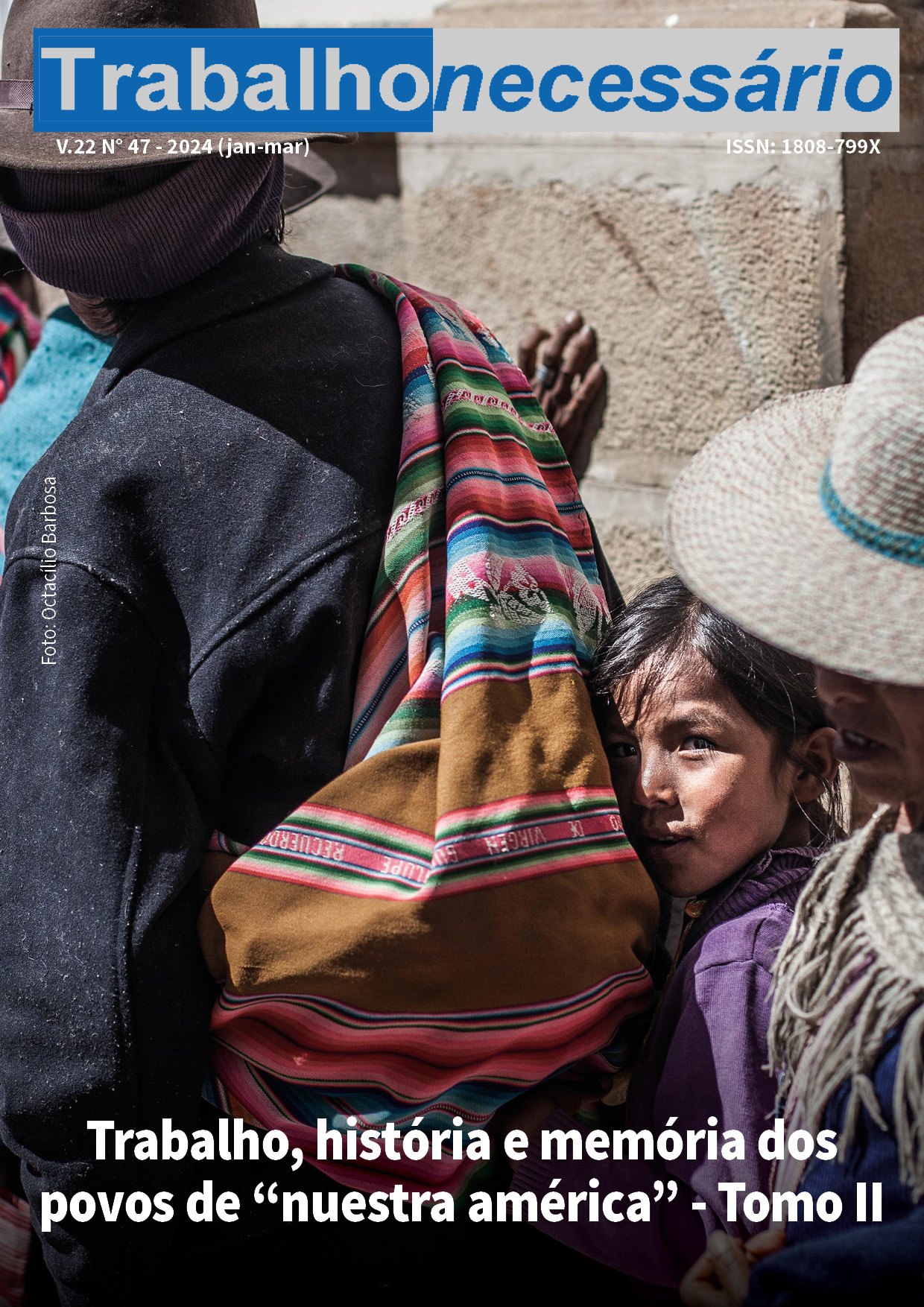EL MUNDO DEL TRABAJO EN EL PENSAMIENTO DE JOSÉ CARLOS MARIÁTEGUI
DOI:
https://doi.org/10.22409/tn.v21i47.59432Resumo
En el actual periodo de transición del sistema-mundo moderno/colonial, ¿sigue vigente la obra de Mariátegui? ¿Tiene algo que decirnos para comprender América Latina y el mundo contemporáneo y para pensar en su transformación? ¿Podemos encontrar en sus reflexiones herramientas teóricas y políticas que nos ayuden a modelar un nuevo orden social más igualitario y democrático? Estas son cuestiones a comentar como introducción a sus reflexiones sobre el mundo del trabajo en el Perú de 1920. Mariátegui llevó adelante una ruptura radical con el modo de examinar los problemas de nuestra sociedad.
Palabras clave: Sistema, Orden, Democracia, Descolonialidad, Modernidad.
Downloads
Referências
GERMANÁ, C. El socialismo indoamericano de José Carlos Mariátegui: Proyecto de reconstitución del sentido histórico de la sociedad peruana. Lima: Amauta, 1995.
MARIÁTEGUI, J. C. Mariátegui Total. Lima: Amauta, t. I., 1994.
PRIGOGINE, I. y STENGERS, I. La nueva alianza. Metamorfosis de la ciencia. Madrid: Alianza Editorial, 2004.
QUIJANO, A. Reencuentro y debate: una introducción a Mariátegui. Lima: Mosca Azul Editores, 1981.
QUIJANO, A. Imperialismo, clases sociales y Estado en el Perú: 1890-1930. Lima: Mosca Azul Editores, 1985.
QUIJANO, A. La nueva heterogeneidad estructural de América Latina. Hueso Húmero, núm. 26, pág. 8-33, febrero. 1990.
QUIJANO, A. Cuestiones y horizontes. De la dependencia histórico-estructural a la colonialidad/descolonialidad del poder. Lima: UNMSM/CLACSO, 2020.
Publicado
Como Citar
Edição
Seção
Licença
Copyright (c) 2024 Revista Trabalho Necessário

Este trabalho está licenciado sob uma licença Creative Commons Attribution 4.0 International License.
DECLARAÇÃO DE DIREITO AUTORAL
Esta Revista é licenciada por Creative Commons (Atribuição 4.0 Internacional).
O processamento e a publicação dos trabalhos não implicam em nenhum tipo de custo para os autores.
Os autores têm autorização para assumir contratos adicionais separadamente, para distribuição não-exclusiva da versão do trabalho publicada nesta revista (ex.: publicar em repositório institucional ou como capítulo de livro), com reconhecimento de autoria e publicação inicial nesta revista.
DECLARACIÓN DE DERECHO AUTORAL
Esta revista es licenciada por Creative Commons (Atribuición 4.0 Internacional).
Lo procesamiento y la publicación de los trabajos no implica en ninguno tipo de costo para los autores.
Los autores tienen permiso para asumir contratos adicionales separadamente, para distribución no exclusiva de la versión del trabajo publicada en esta revista (ej.: publicar em repositorio institucional o como capítulo de un libro), con reconocimiento de autoria y publicación inicial en esta revista.
DECLARATION OF COPYRIGHT
The Journal is licensed by Creative Commons (Attribution 4.0 International).
Processing and publication of the work do not imply any cost to the authors.
The authors are allowed to take on additional contracts separately, non-exclusive distribution of the version of the paper published in this journal (ex.: publish in institutional repository or as a chapter of a book), with an acknowledgment of its initial publication in this journal.
Termo de Transferência de Direitos Autorais
Como condição para a submissão, os autores devem declarar a autoria do trabalho e concordar com o Termo de Cessão de Direitos Autorais, marcando a caixa de seleção após a leitura das cláusulas.
- Declaro que participei da elaboração do referido artigo / resenhas ou de outros elementos para a composição das seções da Revista TrabalhoNecessário-TN, em parte ou no todo; que não omiti qualquer ligação ou acordo de financiamento entre os autores e instituições ou empresas que possam ter interesses na publicação desse trabalho;
- Declaro tratar-se de texto original, isento de compilação, em parte ou na íntegra, de minha autoria ou de outro(os) autor (es) e que segui(mos) as diretrizes (normas e instruções) para os autores;
- Declaro que o texto não foi enviado a outra revista (impressa ou eletrônica) e não o será enquanto a possibilidade de sua publicação esteja sendo considerada pela Revista Trabalhonecessário;
- Declaro que transfiro os direitos autorais do trabalho especificado para a Revista TrabalhoNecessário, comprometendo-me a não reproduzir o texto, total ou parcialmente, em qualquer meio de divulgação (ex.: publicar em repositório institucional ou como capítulo de livro), impresso ou eletrônico, sem prévia autorização dessa Revista, com reconhecimento de autoria e publicação inicial nesta revista.
- Declaro que tenho conhecimento que a cessão do texto à Revista TrabalhoNecessário-TN é gratuita e, portanto, não haverá qualquer tipo de remuneração pela sua utilização.







